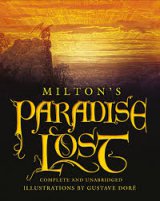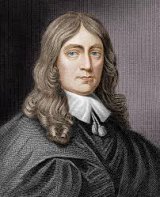Paradise Lost Page #23
Paradise Lost is an epic poem in blank verse by the 17th-century English poet John Milton. The first version, published in 1667, consisted of ten books with over ten thousand lines of verse. A second edition followed in 1674, arranged into twelve books with minor revisions throughout and a note on the versification.
So threatn’d hee, but Satan to no threats Gave heed, but waxing more in rage repli’d. Then when I am thy captive talk of chaines, Proud limitarie Cherube, but ere then Farr heavier load thy self expect to feel From my prevailing arme, though Heavens King Ride on thy wings, and thou with thy Compeers, Us’d to the yoak, draw’st his triumphant wheels In progress through the rode of Heav’n Star-pav’d. While thus he spake, th’ Angelic Squadron bright Turnd fierie red, sharpning in mooned hornes Thir Phalanx, and began to hemm him round With ported Spears, as thick as when a field Of Ceres ripe for harvest waving bends Her bearded Grove of ears, which way the wind Swayes them; the careful Plowman doubting stands Least on the threshing floore his hopeful sheaves Prove chaff. On th’ other side Satan allarm’d Collecting all his might dilated stood, Like Teneriff or Atlas unremov’d: His stature reacht the Skie, and on his Crest Sat horror Plum’d; nor wanted in his graspe What seemd both Spear and Shield: now dreadful deeds Might have ensu’d, nor onely Paradise In this commotion, but the Starrie Cope Of Heav’n perhaps, or all the Elements At least had gon to rack, disturbd and torne With violence of this conflict, had not soon Th’ Eternal to prevent such horrid fray Hung forth in Heav’n his golden Scales, yet seen Betwixt Astrea and the Scorpion signe, Wherein all things created first he weighd, The pendulous round Earth with ballanc’t Aire In counterpoise, now ponders all events, Battels and Realms: in these he put two weights The sequel each of parting and of fight; The latter quick up flew, and kickt the beam; Which Gabriel spying, thus bespake the Fiend. Satan, I know thy strength, and thou knowst mine, Neither our own but giv’n; what follie then To boast what Arms can doe, since thine no more Then Heav’n permits, nor mine, though doubld now To trample thee as mire: for proof look up, And read thy Lot in yon celestial Sign Where thou art weigh’d, & shown how light, how weak, If thou resist. The Fiend lookt up and knew His mounted scale aloft: nor more; but fled Murmuring, and with him fled the shades of night. THE END OF THE FOURTH BOOK. PARADISE LOST BOOK V. Now Morn her rosie steps in th’ Eastern Clime Advancing, sow’d the Earth with Orient Pearle, When Adam wak’t, so customd, for his sleep Was Aerie light, from pure digestion bred, And temperat vapors bland, which th’ only sound Of leaves and fuming rills, Aurora’s fan, Lightly dispers’d, and the shrill Matin Song Of Birds on every bough; so much the more His wonder was to find unwak’nd Eve With Tresses discompos’d, and glowing Cheek, As through unquiet rest: he on his side Leaning half-rais’d, with looks of cordial Love Hung over her enamour’d, and beheld Beautie, which whether waking or asleep, Shot forth peculiar Graces; then with voice Milde, as when Zephyrus on Flora breathes, Her hand soft touching, whisperd thus. Awake My fairest, my espous’d, my latest found, Heav’ns last best gift, my ever new delight, Awake, the morning shines, and the fresh field Calls us, we lose the prime, to mark how spring Our tended Plants, how blows the Citron Grove, What drops the Myrrhe, & what the balmie Reed, How Nature paints her colours, how the Bee Sits on the Bloom extracting liquid sweet. Such whispering wak’d her, but with startl’d eye On Adam, whom imbracing, thus she spake. O Sole in whom my thoughts find all repose, My Glorie, my Perfection, glad I see Thy face, and Morn return’d, for I this Night, Such night till this I never pass’d, have dream’d, If dream’d, not as I oft am wont, of thee, Works of day pass’t, or morrows next designe, But of offence and trouble, which my mind Knew never till this irksom night; methought Close at mine ear one call’d me forth to walk With gentle voice, I thought it thine; it said, Why sleepst thou Eve? now is the pleasant time, The cool, the silent, save where silence yields To the night-warbling Bird, that now awake Tunes sweetest his love-labor’d song; now reignes Full Orb’d the Moon, and with more pleasing light Shadowie sets off the face of things; in vain, If none regard; Heav’n wakes with all his eyes, Whom to behold but thee, Natures desire, In whose sight all things joy, with ravishment Attracted by thy beauty still to gaze. I rose as at thy call, but found thee not; To find thee I directed then my walk; And on, methought, alone I pass’d through ways That brought me on a sudden to the Tree Of interdicted Knowledge: fair it seem’d, Much fairer to my Fancie then by day: And as I wondring lookt, beside it stood One shap’d & wing’d like one of those from Heav’n By us oft seen; his dewie locks distill’d Ambrosia; on that Tree he also gaz’d; And O fair Plant, said he, with fruit surcharg’d, Deigns none to ease thy load and taste thy sweet, Nor God, nor Man; is Knowledge so despis’d? Or envie, or what reserve forbids to taste? Forbid who will, none shall from me withhold Longer thy offerd good, why else set here? This said he paus’d not, but with ventrous Arme He pluckt, he tasted; mee damp horror chil’d At such bold words voucht with a deed so bold: But he thus overjoy’d, O Fruit Divine, Sweet of thy self, but much more sweet thus cropt, Forbidd’n here, it seems, as onely fit For Gods, yet able to make Gods of Men: And why not Gods of Men, since good, the more Communicated, more abundant growes, The Author not impair’d, but honourd more? Here, happie Creature, fair Angelic Eve, Partake thou also; happie though thou art, Happier thou mayst be, worthier canst not be: Taste this, and be henceforth among the Gods Thy self a Goddess, not to Earth confind, But somtimes in the Air, as wee, somtimes Ascend to Heav’n, by merit thine, and see What life the Gods live there, and such live thou. So saying, he drew nigh, and to me held, Even to my mouth of that same fruit held part Which he had pluckt; the pleasant savourie smell So quick’nd appetite, that I, methought, Could not but taste. Forthwith up to the Clouds With him I flew, and underneath beheld The Earth outstretcht immense, a prospect wide And various: wondring at my flight and change To this high exaltation; suddenly My Guide was gon, and I, me thought, sunk down, And fell asleep; but O how glad I wak’d To find this but a dream! Thus Eve her Night Related, and thus Adam answerd sad. Best Image of my self and dearer half, The trouble of thy thoughts this night in sleep Affects me equally; nor can I like This uncouth dream, of evil sprung I fear; Yet evil whence? in thee can harbour none, Created pure. But know that in the Soule Are many lesser Faculties that serve Reason as chief; among these Fansie next Her office holds; of all external things, Which the five watchful Senses represent, She forms Imaginations, Aerie shapes, Which Reason joyning or disjoyning, frames All what we affirm or what deny, and call Our knowledge or opinion; then retires Into her private Cell when Nature rests. Oft in her absence mimic Fansie wakes To imitate her; but misjoyning shapes, Wilde work produces oft, and most in dreams, Ill matching words and deeds long past or late. Som such resemblances methinks I find Of our last Eevnings talk, in this thy dream, But with addition strange; yet be not sad. Evil into the mind of God or Man May come and go, so unapprov’d, and leave No spot or blame behind: Which gives me hope That what in sleep thou didst abhorr to dream, Waking thou never wilt consent to do. Be not disheart’nd then, nor cloud those looks That wont to be more chearful and serene Then when fair Morning first smiles on the World, And let us to our fresh imployments rise Among the Groves, the Fountains, and the Flours That open now thir choicest bosom’d smells Reservd from night, and kept for thee in store.
Translation
Translate and read this book in other languages:
Select another language:
- - Select -
- 简体中文 (Chinese - Simplified)
- 繁體中文 (Chinese - Traditional)
- Español (Spanish)
- Esperanto (Esperanto)
- 日本語 (Japanese)
- Português (Portuguese)
- Deutsch (German)
- العربية (Arabic)
- Français (French)
- Русский (Russian)
- ಕನ್ನಡ (Kannada)
- 한국어 (Korean)
- עברית (Hebrew)
- Gaeilge (Irish)
- Українська (Ukrainian)
- اردو (Urdu)
- Magyar (Hungarian)
- मानक हिन्दी (Hindi)
- Indonesia (Indonesian)
- Italiano (Italian)
- தமிழ் (Tamil)
- Türkçe (Turkish)
- తెలుగు (Telugu)
- ภาษาไทย (Thai)
- Tiếng Việt (Vietnamese)
- Čeština (Czech)
- Polski (Polish)
- Bahasa Indonesia (Indonesian)
- Românește (Romanian)
- Nederlands (Dutch)
- Ελληνικά (Greek)
- Latinum (Latin)
- Svenska (Swedish)
- Dansk (Danish)
- Suomi (Finnish)
- فارسی (Persian)
- ייִדיש (Yiddish)
- հայերեն (Armenian)
- Norsk (Norwegian)
- English (English)
Citation
Use the citation below to add this book to your bibliography:
Style:MLAChicagoAPA
"Paradise Lost Books." Literature.com. STANDS4 LLC, 2024. Web. 24 Nov. 2024. <https://www.literature.com/book/paradise_lost_101>.




Discuss this Paradise Lost book with the community:
Report Comment
We're doing our best to make sure our content is useful, accurate and safe.
If by any chance you spot an inappropriate comment while navigating through our website please use this form to let us know, and we'll take care of it shortly.
Attachment
You need to be logged in to favorite.
Log In